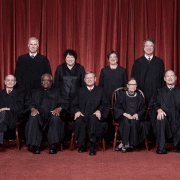The 2020 National Defense Authorization Act provides several new provisions that impact many national science and technology policies, the Defense Department’s research security efforts, and several immigration-related measures. Immigration Law Group consists of top-rated Immigration lawyers who understand the effects of these immigration policy changes. We know how imperative it is to have a dedicated and knowledgeable team working for you. Our staff will not only walk you through these new immigration policy updates but provide your case with the attention and care that it deserves.
What is the 2020 National Defense Authorization Act?
The 2020 National Defense Authorization Act authorizes specific 2020 appropriations and puts into place certain policies for the Department of Defense activities and programs. The bill also includes many immigration-related provisions that affect Liberian nationals, the Afghan special immigrant visa programs, the parole in place for individual service members, and specific protections of the DACA and TPS service members.
Essential Immigration Changes That Come With the Act
The National Defense Authorization Act is the primary way for Congress to execute its Constitutional duties. Specifically, support and raise the Armies, maintain and provide for its Navy while making rules for the government and specific regulations for the land and naval forces. In addition, to the numerous provisions to expand on these primary goals, there have been specific immigration policies that have also been amended.
- Liberian Nationals:
Under this act, Liberians can adjust their status if they have been in the United States since November 20, 2014. Once these individuals obtain their LPR status, they can apply for citizenship without having to wait for an additional period of time. This act will allow individuals to apply one year after enactment.
- Afghan Special Immigrant Visa Program:
Under this act, the Afghan Special Immigrant Visa Program will add 4,000 additional visas. It will affect the Afghan interpreters, translators, and other support staff who had worked with the U.S. military in Afghanistan. However, with the addition of these visas, it will also require reporting and evaluations to be done by the Department of State Inspector General about this program for the Iraqi and the Afghan allies.
- Parole In Place:
This bill provides authorization according to INA Section 212(d)(5) to exercise parole in place on a case-by-case basis for individual service members and their families. This bill will protect those undocumented family members of veterans and active-duty military from deportation. It will confirm how vital the parole in place is, specifically in furthering the family unity and the stability for military families.
- DACA and TPS Service Members
This bill will protect the recipients of DACA and TPS service members from being involuntarily separated from the Armed Forces.
How Will the Act Affect the Country?
The 2020 National Defense Authorization Act will ensure that individuals of the Armed Forces have the resources they need to protect the United States’ interests globally by enhancing America’s national security while also caring for the troops and their families. In addition, this bill will have a significant impact on immigration by increasing the number of special immigrant visas available to Afghans. It will also protecting those undocumented military family members from deportation, which the Trump administration had considered ending. Unfortunately, the bill did not address the desired language that immigration advocates had wanted. Specifically, language that restricted the transfer of military personnel and resources for the border wall or the immigration detention on the military bases. Time will tell how this will affect the country.
Why Call the Immigration Law Group?
With the constant changes in immigration law, it is important to hire an immigration team that has the experience, knowledge, and dedication to handle your immigration matters. With Immigration Law Group, we will provide you with an experienced team that will take on any immigration challenge you may have. Contact our office today for more information or to set up an appointment.










